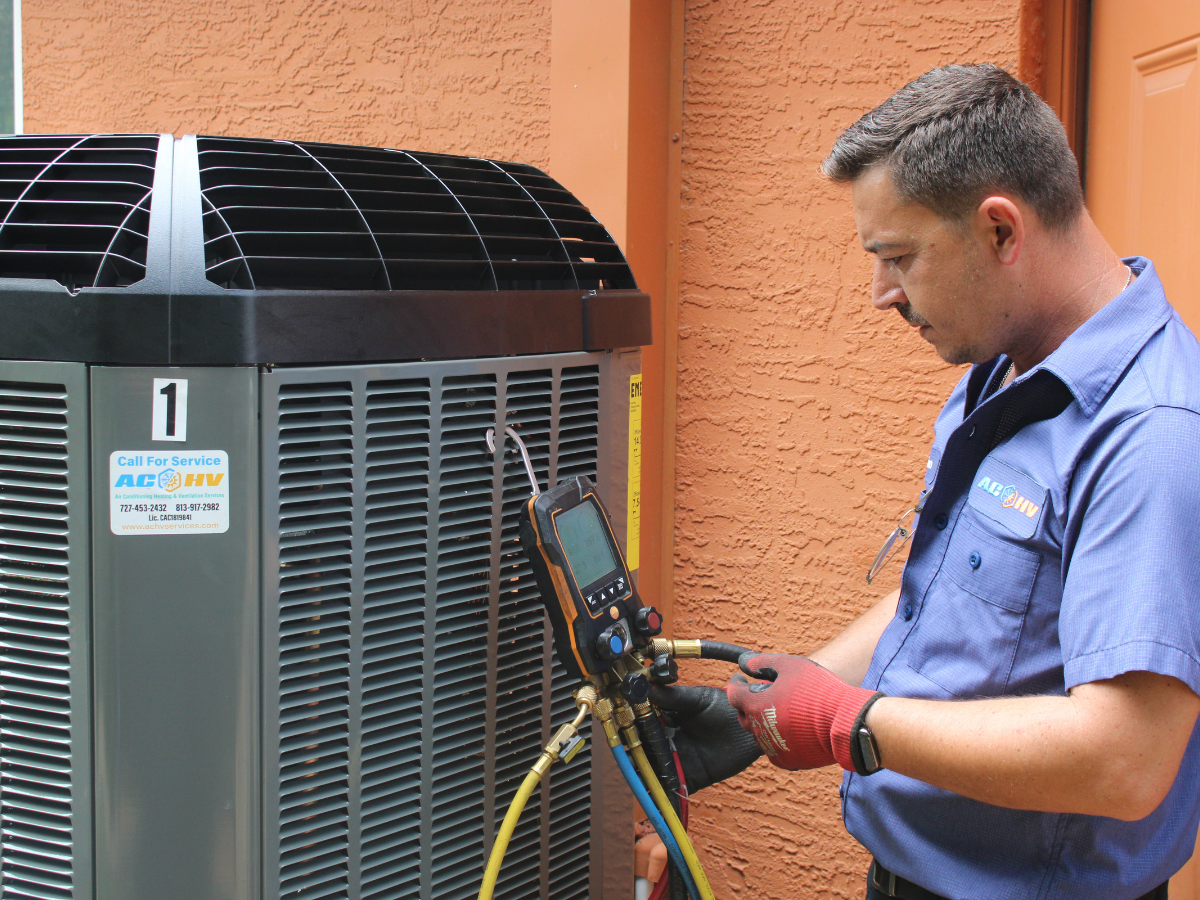As we bid the year goodbye, it’s essential to give your HVAC system a year-end tune-up.
But where do you start?
Our experts at ACHV Services have got you covered and will ensure your system is ready to take on the new year! Make sure to check these items off your list… (Note: You’ll want to call us for a few of these!)
- Monitor the system for unusual noises or smells
- Check and replace air filters
- Inspect and lubricate the blower motors
- Check and calibrate thermostat
- Inspect ductwork
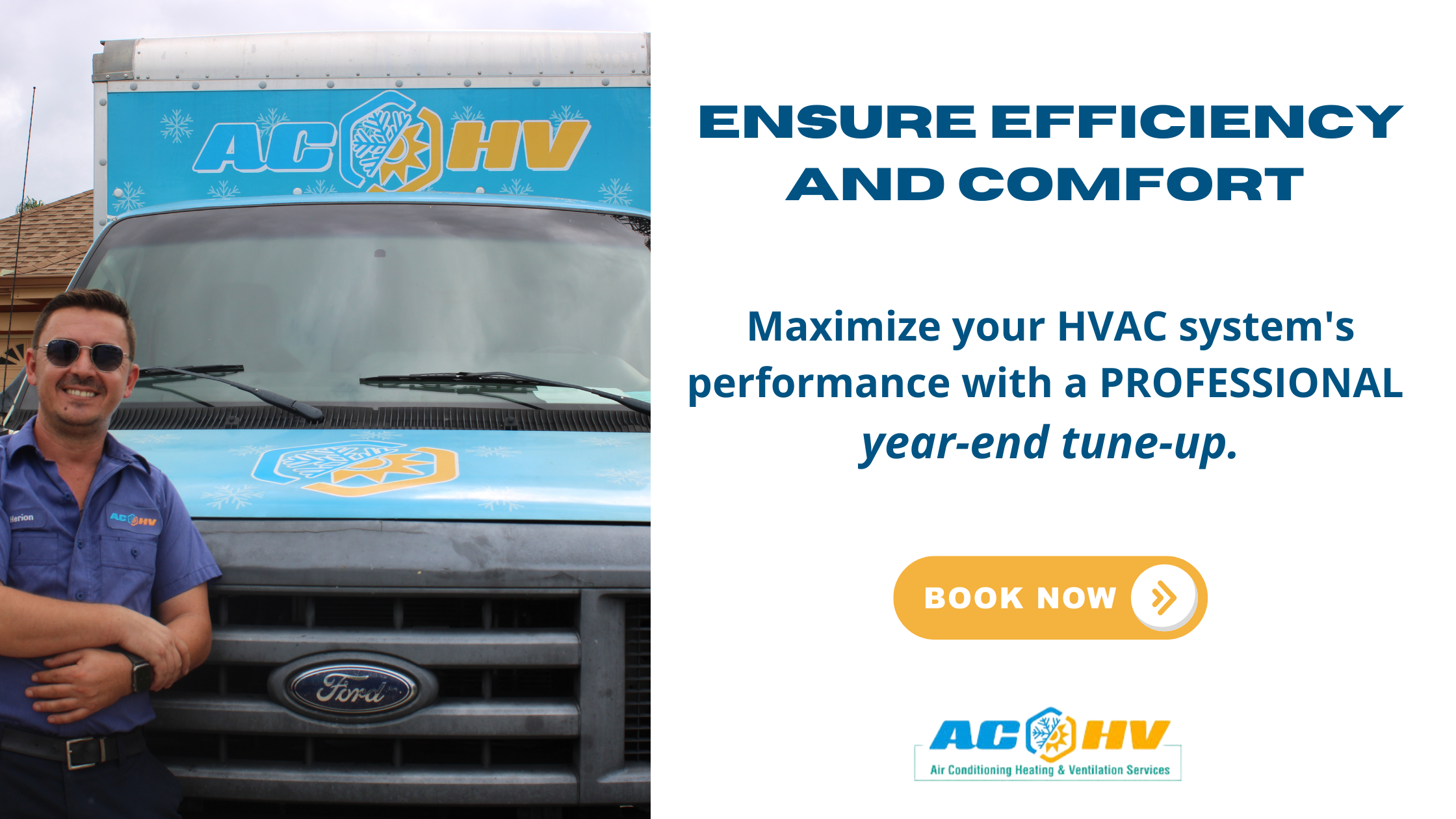
Why A Year-End HVAC Tune-Up Is Essential
Keeping your HVAC system running efficiently and preventing unexpected breakdowns is essential, especially as the year comes to a close.
So, why exactly is it so vital to book that tune-up?
Prolonging Equipment Lifespan
Over time, internal components can loosen or wear out, filters can become clogged with dust, and other issues may arise that, if left unchecked, could culminate in a system failure. A professional tune-up can identify and fix issues early, ensuring your system runs smoothly and lasts longer.
Enhancing Energy Efficiency
When HVAC units are neglected, they tend to work harder to heat or cool your home, using more energy in the process. Maintenance can ensure your HVAC system is operating at its peak efficiency, reducing energy consumption and saving you money in the long run.
Maintaining Warranty Coverage
Warranty terms can often be overlooked, but it’s important to know many manufacturers require regular maintenance for their warranty to remain valid. If you fail to keep up with professional tune-ups, your warranty might be void, leaving you with potentially expensive repair or replacement costs.
Protect your investment and avoid unnecessary expenses by scheduling your end-of-year HVAC tune-up.
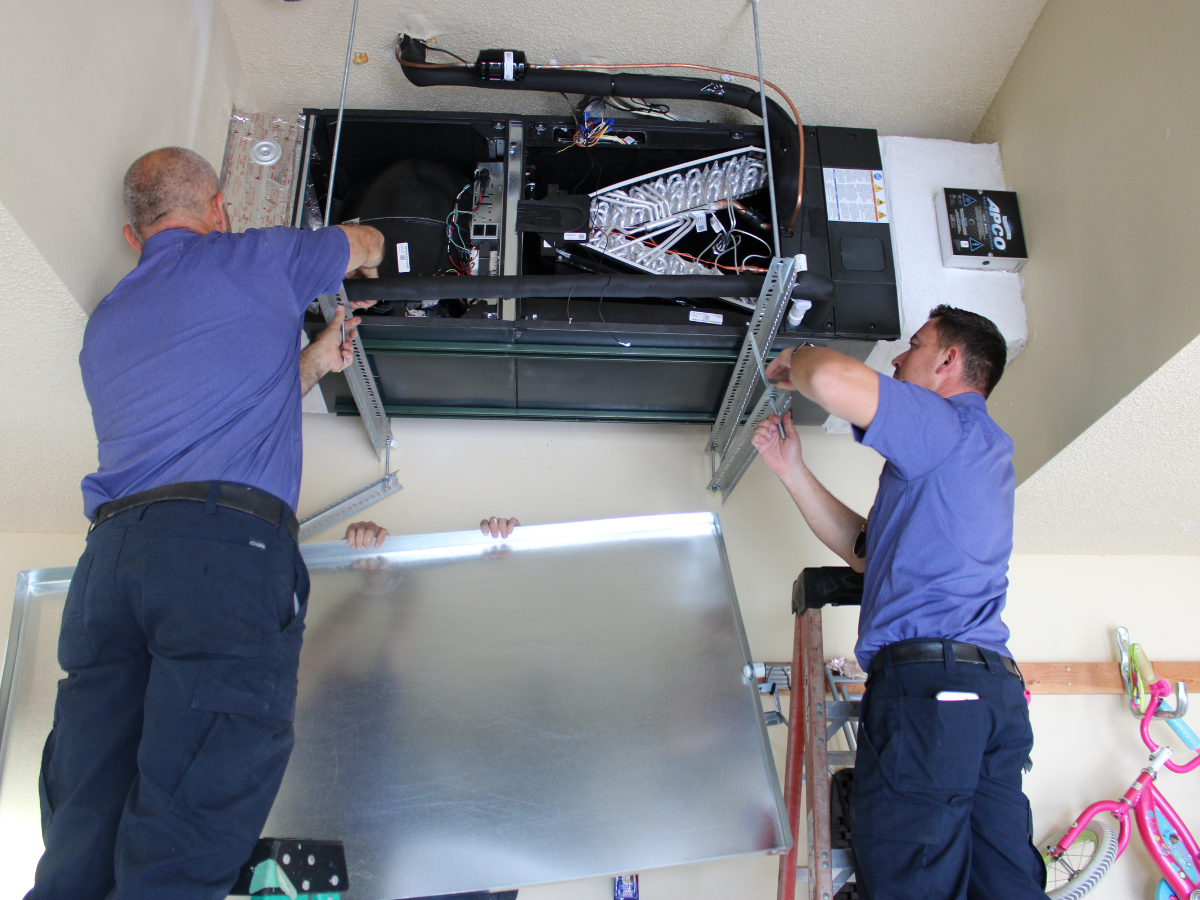
Year-End HVAC Tune-Up Checklist
Now that you know why maintenance is necessary, let’s go over the checklist!
# 1. Monitor the System for Unusual Noises or Smells
Unusual noises or smells can indicate potential issues. These may range from minor hiccups that require basic servicing to significant problems requiring professional attention.
Identifying Unusual Smells
We want to emphasize how important this step is as it is one of the main reasons we get called in the winter. Oftentimes, you may notice a smell like burning dust. This is normal, as the dust on your heater’s coils burns off when you turn it on for the first time this season.
Other odors signal the need for immediate action:
- Burning smell: This may indicate overheating components or wiring issues.
- Musty smell: This may be a sign of mold or mildew.
- Rotten egg smell: This can mean a possible gas leak, requiring immediate intervention for safety.
ACHV Tip: If you notice something off, don’t ignore it. Get it checked out as part of your year-end tune-up to ensure your system is in top shape for the chill of winter and the heat of summer.
Identifying Unusual Sounds
A smoothly running system generally functions quietly, with only the faint hum of air being circulated. However, sudden or persistently unusual noises such as banging, rattling, squealing, or hissing could signify potential issues.
These could stem from loose or broken parts, lubrication issues, or even more serious component malfunctions.
- Banging or clanging: This could indicate loose or broken parts.
- Squealing: This may suggest a bad belt or motor bearing problems.
- Hissing: This usually means that there’s a potential leak in your system.
Read More>> Say Goodbye to Chilly Nights with These Top Heating Fixes
#2. Cleaning and Replacing Air Filters
Air filters trap and eliminate a range of pollutants and allergens, including dust, pollen, and dander, to enhance your indoor air quality.
When air filters become too blocked, they can reduce airflow, forcing your system to work harder.
So, how often should air filters be cleaned or replaced?
Basic filters should be changed every 30-60 days whereas more advanced filters can last from three to six months. When in doubt, ask us!
#3. Inspect and Lubricate the Blower Motors
The blower motor is what pushes heated or cooled air through your home’s duct system. Without it, all the conditioned air your HVAC system produces would just sit unused in your unit.
ACHV Tip: Remember, if you see any signs of wear or damage or if your blower motor doesn’t seem to be running smoothly, don’t hesitate to call our team. Your HVAC system is a big investment, and it’s worth it to keep it in optimal shape.
#4. Check and Calibrate Thermostat
By testing and calibrating your thermostat as part of your year-end HVAC tune-up, you will ensure it is ready to perform accurately and reliably all year round.
- Testing the Sensors: Measure the room temperature at the sensor’s location. Compare this reading with what is shown on your thermostat. If there’s a noticeable difference the sensor isn’t working correctly.
- Calibrating the Sensors: This might involve tweaking the thermostat settings and making some minor adjustments. Depending on the make and model of your HVAC system, you may need a professional to do this.
#5. Inspect Ductwork
Over time, ductwork may accumulate dust, and debris, or even develop leaks, impacting the efficiency of your HVAC system. Sealing is an integral part of the air duct maintenance process. Those small leaks can turn into big problems, increasing your energy costs and causing uneven heating between rooms.
ACHV Tip: Cleaning ductwork requires specialized tools and knowledge, so you will want to hire a professional to do it for you. They’ll be able to remove all the dirt and debris without causing any damage to the delicate ductwork.
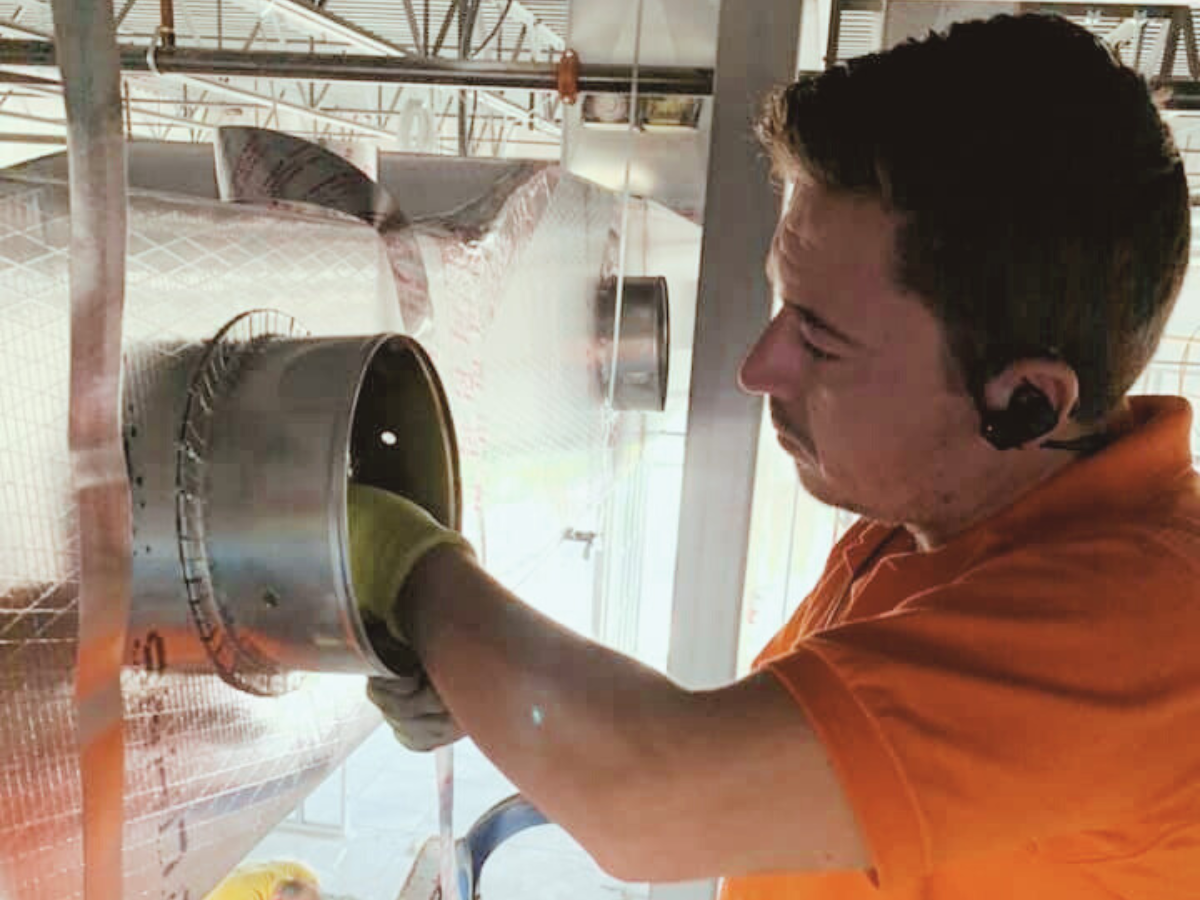
Prevent Costly Repairs with a Year-End Tune-Up
Scheduling a year-end HVAC tune-up is an important task for every homeowner. Not only will it help keep your home warm and cozy during the winter months, but it will also save you money and potential headaches in the future.
It’s all about looking after what’s important, and we certainly believe that your warmth, comfort, and peace of mind are at the top of that list!
Keeping your HVAC system operating at its peak efficiency is no small task and shouldn’t be treated as an afterthought. Contact our pros at ACHV Services today to schedule your year-end tune-up, (727) 453-2432 or (813) 917-2982!

